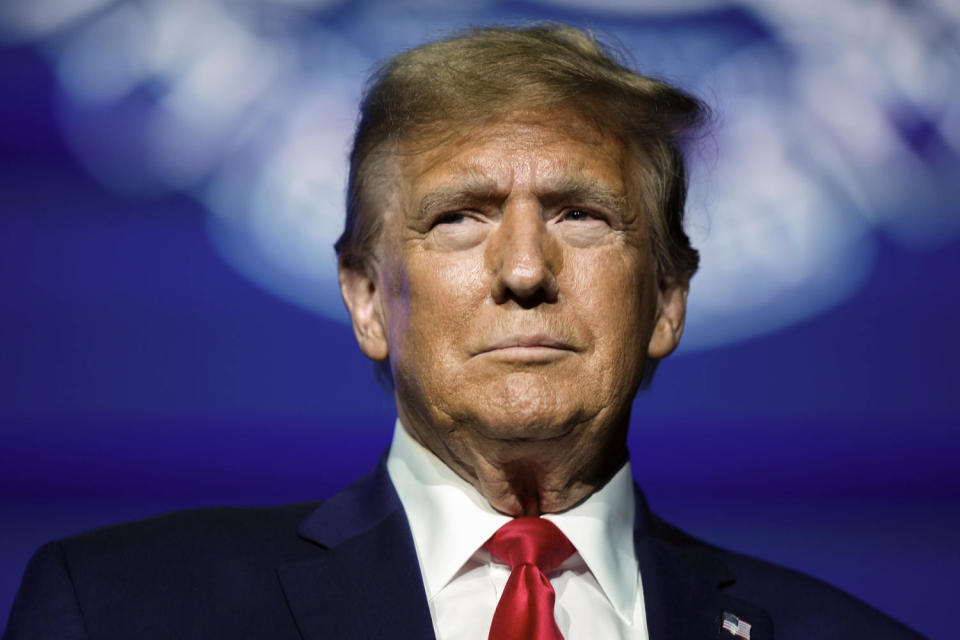Supreme Court to consider Trump immunity claim in further delay of election interference trial
- Oops!Something went wrong.Please try again later.
WASHINGTON — The Supreme Court agreed Wednesday to decide whether former President Donald Trump can claim presidential immunity over criminal election interference charges, adding a new hurdle to a trial taking place.
The court said in a brief order it would hear arguments and issue a ruling on the immunity claim. In the meantime, the case is on hold, meaning no trial can take place.
The order said the court would hear the case, which could take months to resolve, the week of April 22. That timeline allows for a ruling by the end of the court's regular term in June, which is faster than is typical when the court hears arguments but not as fast as prosecutors wanted it to be.
The legal question the court will decide is "whether and if so to what extent does a former president enjoy presidential immunity from criminal prosecution for conduct alleged to involve official acts during his tenure in office," the order said.
Even if Trump loses, the trial could not take place until well into election season, raising questions about whether it will take place at all before Election Day in November. If Trump were to win his appeal before the court, the charges would be dismissed.
After the Supreme Court announcement, Trump repeated on Truth Social his argument that without immunity "a President will not be able to properly function, or make decisions, in the best interest of the United States of America."
"Presidents will always be concerned, and even paralyzed, by the prospect of wrongful prosecution and retaliation after they leave office," he added.

A three-judge panel of the U.S. Circuit Court of Appeals for the District of Columbia ruled against Trump on Feb. 6 but gave him time to file an emergency request at the Supreme Court that would prevent the decision from going into effect.
“For the purpose of this criminal case, former President Trump has become citizen Trump, with all of the defenses of any other criminal defendant,” the appeals court ruling said.
That court did not directly decide whether Trump was engaged in official acts when he was contesting the election results.
Trump’s lawyers have pointed to a 1982 Supreme Court ruling that endorsed presidential immunity from civil lawsuits when the underlying conduct concerns actions within the “outer perimeter” of the president’s official responsibilities.
They argue that presidents should have total immunity for official acts as president and that his actions in questioning the election results were part of his official duties.
The lawyers have conceded that a former president can be prosecuted for conduct unrelated to official acts.
In a separate case involving civil claims against Trump for his role on Jan. 6, 2021, a different panel of judges on the same appeals court rejected his immunity claim, ruling that he was not engaged in official acts because he was acting in his capacity as a candidate for office. Trump opted against appealing that case to the Supreme Court.
Washington-based U.S. District Judge Tanya Chutkan had originally scheduled the trial for March. It is one of four criminal cases that Trump is contesting.
If Trump wins the election, he would be in a position to order that the charges in the Washington case be dismissed. If he has already been convicted at that point, he could seek to pardon himself.
If Trump’s prosecution is allowed, then “such prosecutions will recur and become increasingly common, ushering in destructive cycles of recrimination,” his lawyers wrote in his Supreme Court filing.
Special counsel Jack Smith, who is prosecuting the case, said in his own court papers that it was imperative the issue get decided quickly.
“Delay in the resolution of these charges threatens to frustrate the public interest in a speedy and fair verdict — a compelling interest in every criminal case and one that has unique national importance here,” he wrote.
The Supreme Court has a 6-3 conservative majority, with three Trump appointees. Despite the court’s ideological makeup, Trump has lost several recent cases.
On Feb. 8, the justices heard arguments in a separate Trump-related case about his attempt to avoid being kicked off the ballot in Colorado. In that case, the court seems likely to rule in his favor.
Trump’s immunity claim was prompted by a four-count indictment in Washington, including charges of conspiracy to defraud the U.S. and conspiracy to obstruct an official proceeding. He has pleaded not guilty.
Chutkan in December rejected Trump’s plea to dismiss the indictment on presidential immunity and other constitutional grounds.
This article was originally published on NBCNews.com

